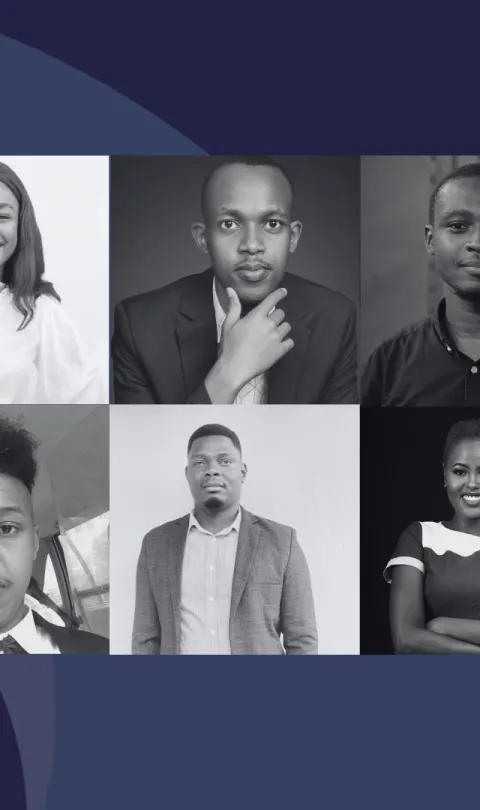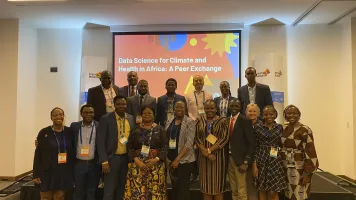In August 2024, the first cohort of the CAN Data Science Fellowship concluded, marking a milestone in innovative problem-solving for Africa's climate and health challenges. Fellows from Nigeria, Kenya, Ghana, the Democratic Republic of Congo (DRC), Mali, and Guinea applied cutting-edge data science to combat land degradation, climate change, pollution, and public health crises. You can learn more about their work here and subscribe to our newsletter to receive first-hand updates as we publish more impact stories from the first cohort.
Building on this momentum, we launched a call for applications for the second cohort, receiving more than 3,500 submissions from 30 African countries. After rigorous assessments and interviews, we proudly present the 10 exceptional fellows of Cohort 2. This diverse group, spanning East, West, and Southern Africa, is set to tackle the intersection of climate and health with transformative data-driven approaches.
Data science driving change
Data science is revolutionizing how we address the effects of climate change on human health. By leveraging predictive analytics, machine learning, and big data, we can uncover patterns, anticipate risks, and craft interventions to enhance resilience. The CAN Data Science Fellows will embark on projects that translate complex datasets into actionable insights, addressing challenges such as extreme weather impacts, food security, and disease prevalence.
Their work will not only inform policy but also foster sustainable, healthier communities across Africa.
Meet the Fellows of Cohort 2
Here’s a glimpse into the talented individuals driving change in this year’s fellowship:
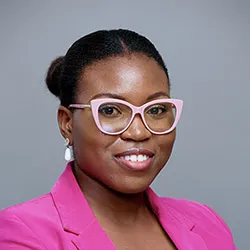
Elishama Yomi-Agbajor (Nigeria)
Elishama is a data and business intelligence professional with degrees in environmental sciences and extensive experience in finance and research. Currently a Data Analyst at Interswitch Limited, she excels in automating analytics and fostering a data-centric culture. Her expertise includes advanced data visualization, SQL, and Power BI, which she has used to enhance business decision-making, drive revenue growth, and streamline processes. Passionate about sustainability and community impact, Elishama will collaborate with the HiPIC research group at the University of Nigeria Nsukka, leveraging machine learning to analyze the impact of climate factors on mortality rates in sickle cell anemia patients.
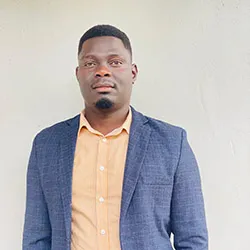
Enock Mwesigwa (Uganda)
Enock is a seasoned software engineer and data scientist with a robust academic background in computer science. His professional journey includes developing AI-driven solutions for financial inclusion and social impact, such as farmer credit scoring and gender-based violence data analysis. As a mentor at Eloquent Data Academy, he has trained more than 250 aspiring data scientists. Enock’s fellowship project with the Uganda Bureau of Statistics focuses on building machine-learning models for flood and disease mapping in the Greater Kampala Metropolitan Area.

Andrew Karanja (Kenya)
Andrew, a graduate in Applied Statistics with Computing from Moi University, brings a unique mix of professional experience and self-driven data science projects. He has worked at Safaricom PLC, enhancing machine learning models to improve customer experiences, and contributed to research at the Kenya Agriculture and Livestock Research Organization (KALRO), analyzing farmer sentiment on drought-resistant crops. Proficient in Python, R, and SQL, Andrew’s fellowship will focus on the IMTA-Health initiative, integrating aquaculture and farming systems to address food security and malnutrition in rural Kenya.
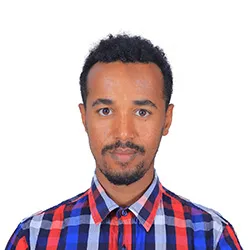
Yibeltal Assefa (Ethiopia)
Yibeltal is an accomplished researcher and lecturer with dual Master’s degrees in Data Science and Software Engineering. He specializes in machine learning, computer vision, and AI applications across healthcare, tourism, and natural language processing. His academic background from Bahir Dar University and the University of Gondar equips him to transform complex data into practical solutions. Yibeltal’s fellowship project will develop predictive models for vector-borne diseases, focusing on malaria prevalence influenced by climate change in Africa.

Florence Nguuni (Kenya)
Florence is a data scientist and public health expert with a strong academic foundation in population health. Her professional experience spans data collection, machine learning, and visualization, with a proven ability to translate complex health data into actionable insights. Florence has applied her expertise to create impactful reports that guide public health policy. During her fellowship, she will explore the relationship between climate change and cancer risks in Kenya, developing evidence-based strategies for prevention and resilience.
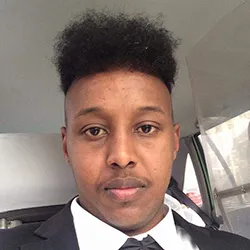
Mohamed Gele (Somalia)
Mohamed is a seasoned data scientist with over a decade of experience across public, private, and multilateral sectors. He holds advanced qualifications in data science and is adept at addressing global challenges through data-driven innovations. Mohamed’s fellowship research will model the complex relationship between climate change, food security, and public health in Somalia, providing critical insights to inform policy and resilience strategies.

Peace Ododo (Nigeria)
Peace, a Systems Engineering graduate, is a data scientist with expertise in GIS, AI, and business intelligence. She has worked with organizations like Adebayo Adeleke LLC to enhance decision-making through data analytics and has mentored young women in tech to promote diversity in the field. During her fellowship, Peace will assess the impact of climate change on food security and malnutrition in Kebbi State, Nigeria, employing GIS and machine learning to design localized interventions.
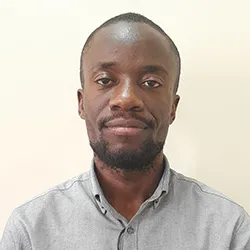
Steven Bowah (Malawi)
Steven is a Biomedical Scientist with over seven years of experience in public health and laboratory sciences. He is currently pursuing a Master’s degree in Epidemiology at Kamuzu University of Health Sciences, with research focusing on the intersection of climate and health. At the Malawi Blood Transfusion Service, Steven has ensured the safe and timely distribution of critical health supplies. His fellowship project investigates the impact of flooding on blood transport networks in Northern Malawi, proposing adaptive strategies to maintain healthcare access during climate events.
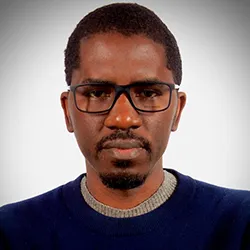
Aboubacar Diallo (Guinea)
Aboubacar is a technical advisor with over a decade of expertise in digital health and ICT for development. He holds Master’s degrees in Artificial Intelligence, ICT for Development, and Applied Mathematics. Aboubacar has led initiatives such as designing e-learning platforms and developing predictive models for health policy decisions. His fellowship will focus on enhancing healthcare access in rural Guinea by mapping health facilities and analyzing climate impacts on health systems.
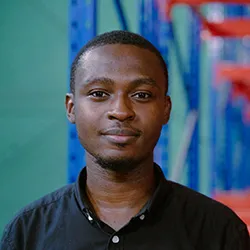
Dan Poku (Ghana)
Dan is a science professional with a computer science background, and he is advancing his expertise through a master’s program in information systems and IT innovation. Passionate about health, agriculture, and sustainable development, Dan has dedicated his career to creating innovative solutions for critical challenges in these sectors. As a CAN fellow, he will use climate and health datasets to develop a cloud-native machine-learning application to predict respiratory health outcomes in Ghana. This project aims to support early-warning public health outreach and inform policy decisions, contributing to better health resilience in the face of climate change.
Looking ahead
This new cohort of CAN Data Science Fellows embodies the transformative power of data in addressing Africa's most pressing challenges. Their projects will drive innovation, inform policies, and inspire actionable change to create a sustainable and resilient future.
Stay updated on their progress and impact by subscribing to our newsletter.
